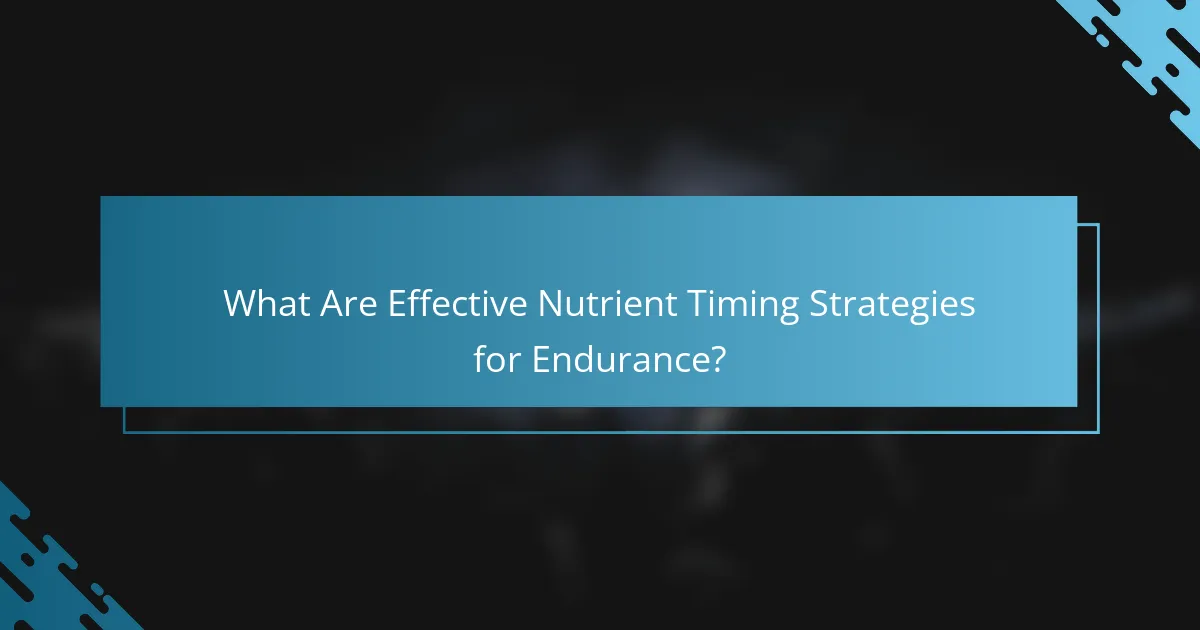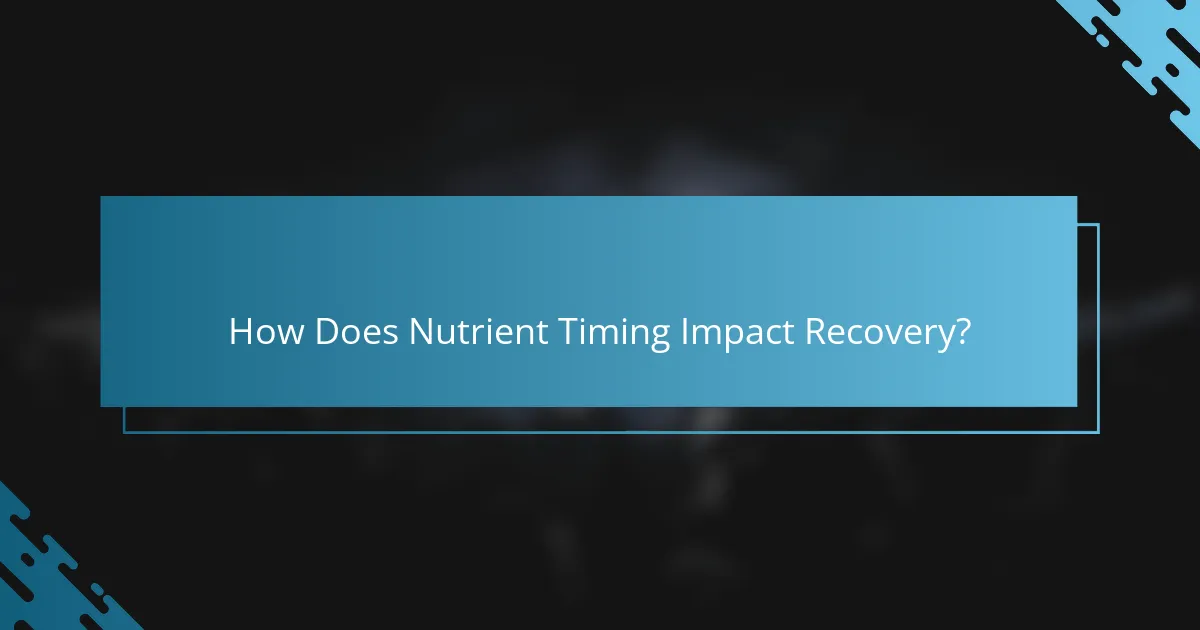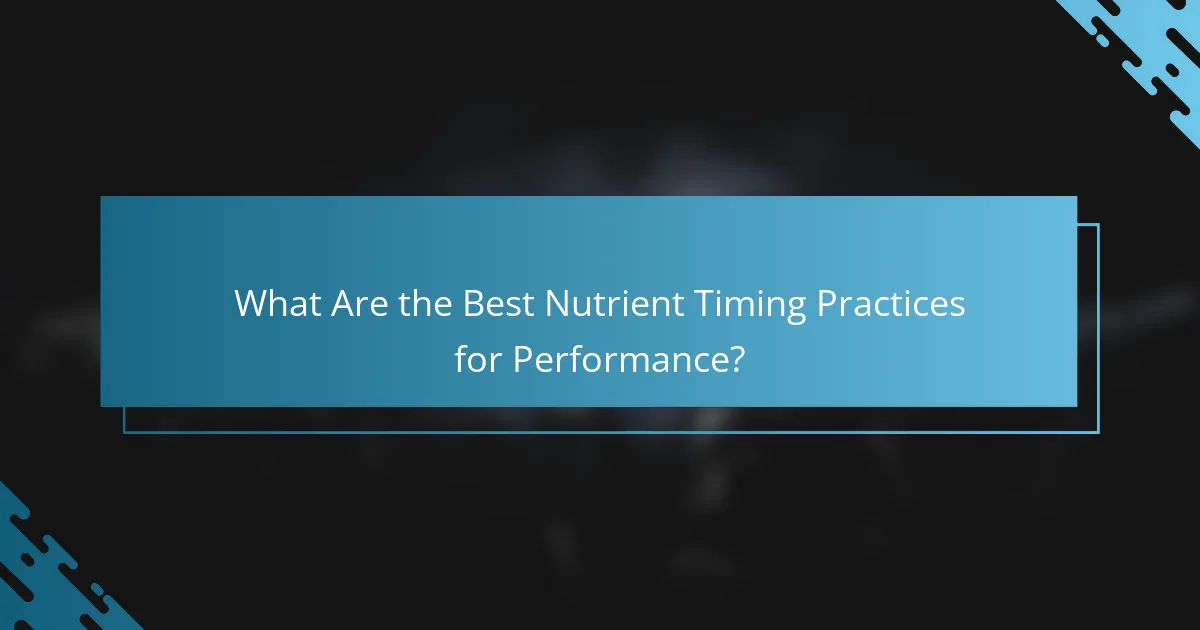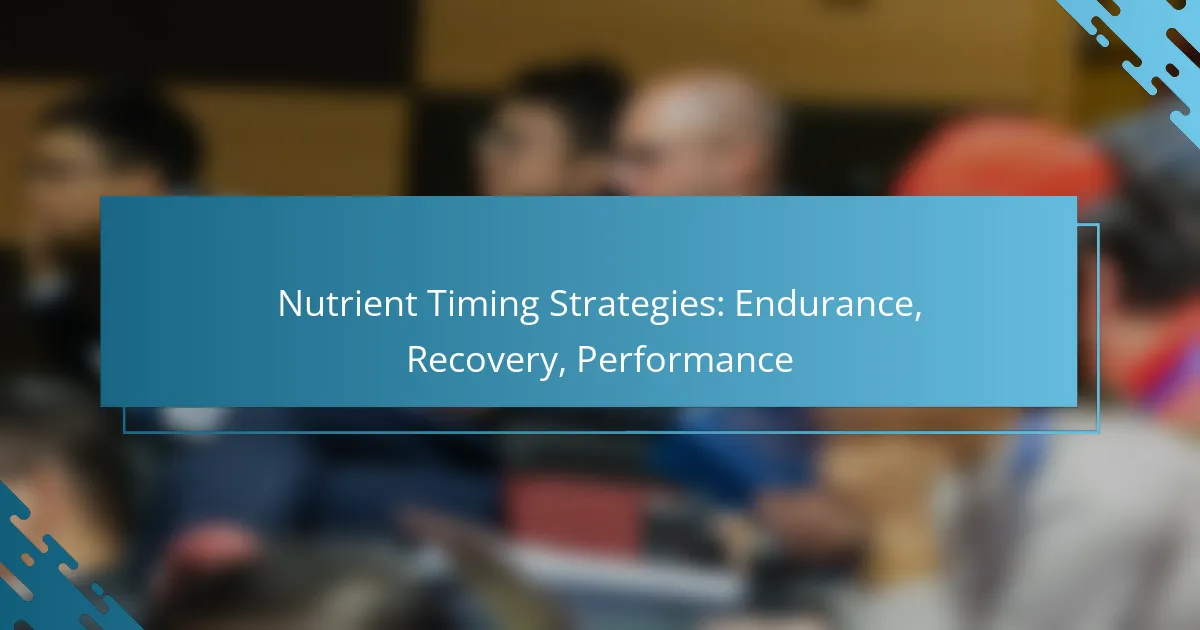Nutrient timing strategies play a crucial role in enhancing endurance, recovery, and overall athletic performance. By strategically planning meals and nutrient intake around workouts, athletes can optimize energy availability, support muscle repair, and improve recovery times. Key practices include pre-workout carbohydrate loading, post-workout protein consumption, and careful hydration management.

What Are Effective Nutrient Timing Strategies for Endurance?
Effective nutrient timing strategies for endurance focus on optimizing energy availability and recovery through strategic meal planning around workouts. Key strategies include pre-workout carbohydrate loading, post-workout protein intake, hydration timing, and meal frequency adjustments.
Pre-Workout Carbohydrate Loading
Pre-workout carbohydrate loading enhances glycogen stores, which is crucial for endurance performance. Aim to consume 1-4 grams of carbohydrates per kilogram of body weight about 3-4 hours before exercise to maximize energy levels.
Examples of effective carbohydrate sources include pasta, rice, and fruits. Be cautious of high-fiber foods close to your workout, as they may cause gastrointestinal discomfort.
Post-Workout Protein Intake
Post-workout protein intake is vital for muscle repair and recovery. Consuming 15-25 grams of protein within 30 minutes after exercise can significantly aid in muscle recovery and growth.
Good protein sources include whey protein shakes, chicken, or Greek yogurt. Pairing protein with carbohydrates can further enhance recovery by replenishing glycogen stores.
Hydration Timing
Hydration timing is essential for maintaining performance and preventing dehydration. Drink water or electrolyte-rich beverages before, during, and after exercise to ensure optimal hydration levels.
A general guideline is to consume 500-700 mL of water in the hours leading up to your workout and to drink regularly during exercise, aiming for about 200-300 mL every 15-20 minutes.
Meal Frequency Adjustments
Adjusting meal frequency can help sustain energy levels throughout the day. For endurance athletes, consuming smaller meals or snacks every 3-4 hours can provide a steady supply of nutrients and energy.
Focus on balanced meals that include carbohydrates, proteins, and healthy fats. Avoid long gaps between meals to prevent energy dips that can affect performance.

How Does Nutrient Timing Impact Recovery?
Nutrient timing significantly influences recovery by optimizing muscle repair and replenishing energy stores after exercise. Properly timed nutrition can enhance recovery speed and improve overall performance in subsequent workouts.
Importance of Post-Exercise Nutrition
Post-exercise nutrition is crucial for effective recovery, as it helps to restore glycogen levels and repair muscle tissue. Consuming the right nutrients soon after exercise can reduce muscle soreness and fatigue, allowing athletes to train more effectively.
A balanced meal or snack containing carbohydrates and protein within 30 to 60 minutes post-exercise is often recommended. This timeframe is when muscles are most receptive to nutrient uptake, maximizing recovery benefits.
Timing of Protein and Carbohydrates
For optimal recovery, it is essential to consume protein and carbohydrates in a specific ratio. A common guideline is to aim for a 3:1 or 4:1 ratio of carbohydrates to protein. This combination helps replenish glycogen stores while providing the amino acids necessary for muscle repair.
Carbohydrates should ideally be consumed immediately after exercise, while protein can be ingested shortly thereafter. This approach ensures that the body receives the nutrients it needs to recover efficiently.
Role of Supplements in Recovery
Supplements can play a supportive role in recovery, especially when whole food options are not available or convenient. Protein powders, branched-chain amino acids (BCAAs), and creatine are popular choices that can enhance recovery when used appropriately.
However, it is essential to choose high-quality supplements and to follow recommended dosages. Relying solely on supplements without a balanced diet may not yield the best recovery outcomes.

What Are the Best Nutrient Timing Practices for Performance?
The best nutrient timing practices for performance focus on strategically consuming food and supplements before, during, and after physical activity to enhance endurance, recovery, and overall athletic output. Proper timing can optimize energy levels, improve recovery rates, and support muscle repair.
Pre-Event Meal Timing
Pre-event meal timing is crucial for maximizing energy availability during endurance activities. Ideally, consume a balanced meal containing carbohydrates, proteins, and fats about 3-4 hours before the event to allow for digestion and absorption.
If time is limited, a smaller snack rich in carbohydrates and moderate in protein can be eaten 30-60 minutes prior. Options like a banana with nut butter or a sports drink can provide quick energy without causing digestive discomfort.
Intra-Workout Nutrition
Intra-workout nutrition helps maintain energy levels during prolonged exercise. For endurance events lasting over 90 minutes, consuming carbohydrates in the form of gels, chews, or drinks can sustain performance and delay fatigue.
A general guideline is to aim for 30-60 grams of carbohydrates per hour during intense workouts. Staying hydrated with water or electrolyte drinks is also essential to prevent dehydration and maintain optimal performance.
Post-Event Recovery Protocols
Post-event recovery protocols are vital for restoring energy and repairing muscles. Consuming a meal or snack rich in carbohydrates and protein within 30-60 minutes after exercise can significantly enhance recovery. A common ratio is 3:1 carbohydrates to protein.
Examples include a protein shake with a banana or a turkey sandwich on whole-grain bread. Additionally, staying hydrated and incorporating micronutrients through fruits and vegetables can further support recovery processes.

What Criteria Should You Consider for Nutrient Timing?
When planning nutrient timing, consider the type of activity, duration of exercise, and individual metabolism. These factors influence how and when to consume nutrients for optimal endurance, recovery, and performance.
Type of Activity
The type of activity plays a crucial role in determining nutrient timing strategies. Endurance activities, such as long-distance running or cycling, may require carbohydrate loading before the event and regular carbohydrate intake during prolonged sessions. In contrast, strength training often benefits from protein intake both before and after workouts to support muscle repair and growth.
For mixed activities, like circuit training, a balanced approach involving both carbohydrates and proteins can enhance performance and recovery. Tailoring your nutrient intake to the specific demands of your activity can maximize results.
Duration of Exercise
Duration significantly impacts nutrient timing. For exercises lasting less than an hour, a balanced meal a few hours prior is typically sufficient. However, for prolonged activities exceeding 90 minutes, consuming carbohydrates during the session can help maintain energy levels and improve performance.
Post-exercise, aim to consume a combination of carbohydrates and proteins within 30 to 60 minutes to replenish glycogen stores and support muscle recovery. This window is often referred to as the “anabolic window,” where nutrient uptake is most effective.
Individual Metabolism
Individual metabolism varies widely, affecting how nutrients are processed and utilized. Factors such as age, body composition, and fitness level can influence metabolic rates and nutrient needs. For instance, athletes with a higher muscle mass may require more protein for recovery compared to those with lower muscle mass.
It’s essential to listen to your body and adjust nutrient timing based on personal experience. Keeping a food and exercise journal can help identify patterns and optimize your nutrient intake for better performance and recovery.

How Do Different Sports Influence Nutrient Timing?
Different sports require tailored nutrient timing strategies to optimize performance, recovery, and endurance. Athletes must consider the specific demands of their sport to effectively fuel their bodies and enhance recovery.
Endurance Sports vs. Strength Training
Endurance sports, such as running or cycling, typically require a higher carbohydrate intake to sustain prolonged energy levels. Athletes in these disciplines should focus on consuming carbohydrates before, during, and after their activities to replenish glycogen stores and support recovery.
In contrast, strength training emphasizes protein intake to aid muscle repair and growth. Strength athletes should prioritize protein consumption within a short window post-exercise, ideally within 30 to 60 minutes, to maximize muscle recovery and adaptation.
Team Sports Nutritional Needs
Team sports, like soccer or basketball, demand a balanced approach to nutrient timing, incorporating both carbohydrates and proteins. Players should consume a carbohydrate-rich meal or snack before games to ensure adequate energy levels and maintain performance throughout the match.
During games, quick-digesting carbohydrates, such as sports drinks or gels, can help maintain energy. Post-game, a combination of carbohydrates and proteins is essential for recovery, ideally consumed within an hour after the event to replenish glycogen and support muscle repair.

What Are Emerging Trends in Nutrient Timing?
Emerging trends in nutrient timing focus on optimizing the intake of macronutrients around exercise to enhance endurance, recovery, and overall performance. These strategies emphasize the importance of when to consume nutrients rather than just what to eat, tailoring approaches to individual needs and specific training goals.
Personalized Nutrition Approaches
Personalized nutrition approaches in nutrient timing consider individual differences such as metabolism, activity level, and specific fitness goals. This customization allows athletes to optimize their nutrient intake to match their unique physiological responses and performance demands.
For example, an endurance athlete may benefit from higher carbohydrate intake before long training sessions, while a strength athlete might prioritize protein consumption post-workout for muscle recovery. Tracking personal responses to different timing strategies can help refine these approaches over time.
To implement personalized nutrition effectively, consider keeping a food and performance diary. Note how different meal timings affect your energy levels and recovery. This data can guide adjustments to your nutrient timing strategy, ensuring it aligns with your training schedule and performance objectives.
